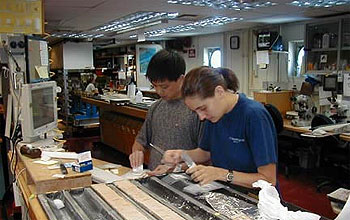|

Press Release 04-152
New Ocean Drilling Research Findings Presented at American Geophysical Union (AGU) Fall Meeting

December 13, 2004
Arlington, VA.--Scientists from around the globe will present research results on more than 200 discoveries made possible through scientific ocean drilling at the American Geophysical Union Fall Meeting in San Francisco from December 13-17, 2004. These papers, which draw upon three generations of ocean drilling programs supported in part by the National Science Foundation (NSF), provide new knowledge related to topics ranging from paleoclimatology to ocean sciences to volcanology.
Future opportunities for advances from the Integrated Ocean Drilling Program (IODP) will be discussed at a Town Meeting on Tues. evening, Dec. 14, from 5:30-7:45 p.m., at the Grand Hyatt Hotel, 345 Stockton Street. This briefing will highlight the scientific possibilities of the coming year as well as provide information on the inaugural IODP expeditions conducted with the research vessel JOIDES Resolution.
The following sessions highlight some of the ways in which ocean drilling contributes to understanding the Earth.
Rapid Climate Change
Ocean drilling has revolutionized scientists' understanding of rapid and extreme climate change. In these sessions, scientists will present research results that highlight advances in understanding the Paleocene-Eocene Thermal Maximum, a rapid global warming event that occurred 55 million years ago.
"Cretaceous/Cenozoic Greenhouse Climate Extremes: Causes and Consequences": Session 1 (PP11B), Mon. a.m., MCC 1 and Session II (PP14A), Mon. p.m., MCC 1
Climate Change Triggers
More than 15 papers on climate change research will be presented in two sessions. The research is based on nearly seven kilometers of sediment cores recovered from the Pacific Ocean. The sediments provide information on climate triggers and effects on several scales, from the slow tectonic uplift of the Andes, to abrupt climate shifts within human history.
"Changes in Southeastern Pacific Circulation, Productivity, and Continental Climate on Tectonic, Orbital, and Millennial Timescales": Session I (PP43B), Thurs. p.m., MCC 2000; and Session II (PP51F) Fri. a.m., MCC 2.
Plumes or Not?
Four sessions titled "Plumes or Not?" examine challenges to the long-held theory that plumes of hot material rising from the deep mantle, possibly as deep as the Earth's core, form "hot spots," major volcanic regions that are considered anomalous in a plate tectonic context. Ocean drilling has provided samples from many different types of environments, such as seamounts, plateaus and ridges, that span all major ocean basins and long periods of geologic time. A press conference on this topic will be held on Weds., Dec. 15 at 11:00 a.m.
Plumes or Not I (V43G) and II (V44B), Thurs. p.m., MCC 3008;
Plumes or Not III (V51B), Fri. a.m., MCC 1; Plumes or Not IV (V53C), Friday p.m., MCC 3008
-NSF-

Media Contacts
Cheryl L. Dybas, NSF (703) 292-8070 cdybas@nsf.gov
Kasey White, IODP (202) 232-3900 kwhite@joiscience.org
Program Contacts
James F. Allan, NSF (703) 292-8581 jallan@nsf.gov
Rodey Batiza, NSF (703) 292-7710 rbatiza@nsf.gov

The National Science Foundation (NSF) is an independent federal agency that supports fundamental research and education across all fields of science and engineering. In fiscal year (FY) 2009, its budget is $9.5 billion, which includes $3.0 billion provided through the American Recovery and Reinvestment Act. NSF funds reach all 50 states through grants to over 1,900 universities and institutions. Each year, NSF receives about 44,400 competitive requests for funding, and makes over 11,500 new funding awards. NSF also awards over $400 million in professional and service contracts yearly.
 Get News Updates by Email Get News Updates by Email
Useful NSF Web Sites:
NSF Home Page: http://www.nsf.gov
NSF News: http://www.nsf.gov/news/
For the News Media: http://www.nsf.gov/news/newsroom.jsp
Science and Engineering Statistics: http://www.nsf.gov/statistics/
Awards Searches: http://www.nsf.gov/awardsearch/
| 

